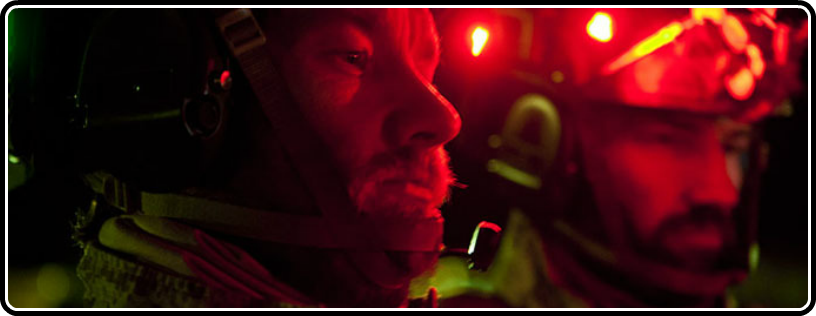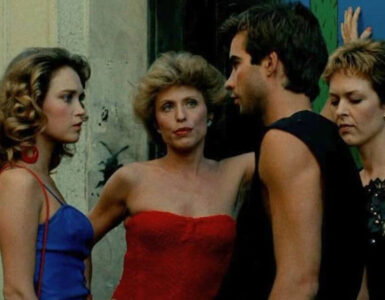In the year of film that was 2012, there were a handful of intriguing narratives playing out. The battle between film and digital as a way to shoot a motion picture, the continual rise of Marvel’s cinematic universe and the conclusion of DC and WB’s Batman trilogy, all of these stories were ones that the film world mulled over during the year past. However, not a single one has been more talked about and more controversial than all the different narratives surrounding Kathryn Bigelow’s latest film, Zero Dark Thirty.
Finding the director teaming back up with writer Mark Boal after their masterful war drama The Hurt Locker, the film has also found that pair under fire with a light being placed on them from critics to politicians for the film’s stance on torture. Toss in the controversy surrounding just how much access to top secret information the pair (particularly the known investigative journalist Boal) had, and you’ve got easily the most hotly debated film of 2012.
And now, with it finally leaving New York and LA for a wide release this weekend, Bigelow and Boal’s new masterpiece can play to the masses. Their meditation on obsession through the guise of the greatest manhunt in recorded human history, the search for Osama bin Laden, is not only one of the best films of 2012, but it may be the best bit of cinematic journalism in recent memory.
For ten years, a team of specialists in this nation’s intelligence and military communities worked throughout different leads to find the world’s #1 most wanted fugitive. With world views changing over that decade, including the nation’s stance on torture and how terrorists are detained, Zero Dark Thirty is a haunting, Zodiac-esque look into the obsession of this team, and particularly its leader, Maya, and this nation’s search for the biggest symbol of villainy this generation has ever known.
There’s a certain elephant in this room though, or at least any room in which a discussion of Bigelow’s film takes place. Posited as a film that stands firmly on the pro-side of the torture debate, some critics and even politicians are doing this film a disservice by looking at it as a black and white film about an entirely murkier concept. To Bigelow and Boal’s credit, the film does a brilliant job in not landing on either side of the debate here. Some information, yes, is gathered through detainee testimony, and while a character states, in the film’s final act, that this entire case could be broken if that policy was still in place, but instead, the case is broken open by a woman simply connecting dots through research and drive. And even that description doesn’t do the film’s level of intellectual grey justice, with all of its breathtaking tonality and atmosphere coming directly from its writer, its director and its cast of actors all of whom give brilliant performances.
Bigelow’s appreciation for the fuzziness of this entire narrative extends into her aesthetic. While the film itself finds cinematographer Greg Fraser at the very top of his game, giving the film a grey color palette and with the use of depth of field (often leaving those things out of focus to turn into a blob of uncertainty, quite like this entire debate, nothing but grey) the film’s visual style hints at a world that is much more convoluted, much more complex than any of us could ever imagine. The world photographed here is twisty and full of moving parts, and the brilliance here is Bigelow, and more so Boal, and their abilities to paint this world as the grey and in flux universe that it truly is.
Boal’s screenplay is truly something to behold. With these aforementioned moving parts always in motion, Boal is able to add gravitas to every moment here, never allowing the viewer to take a breath, for fear that they may miss a pivotal point. A character study first and foremost, this is a wonderfully paced meditation on obsession similar in style to a film like Michael Mann’s Heat or The Insider and in tone and exhaustive narrative like Fincher’s Zodiac, the film’s closest kin. With silly controversy smearing the focus surrounding this picture into something political, the film stands, and will stand, as a look into obsession and the hunt for a symbol. Not a man. Bin Laden, in history, shall not be remembered as a man, but instead a symbol of violence in an era on the brink, and Boal’s screenplay gets at that ideology in a way we have yet to see in this generation of war films.
It also helps to have a brilliant set of performances to back this picture up. Leading the way is Jessica Chastain as the woman (even though, frankly, I hesitate to bring gender up here because she has more cajones than any single man in this picture) spearheading the operation, and she’s career defining. Introduced to her during one of the film’s few torture sequences (most of which are given up by the end of the first act), we see that she’s come from Washington with a history, and that she’s here to complete her mission. She gives a fire-filled performance, and yet one with enough nuance to make you feel as though she both knows exactly what she’s doing but is still rough around the edges enough to where her energy and fire may be her downfall, or fuel an utter breakthrough in her hunt. And her supporting cast is killer as well.
Jason Clarke plays Dan, a man she meets and is teamed up with on the ground, and is a perfect foil for Chastain’s Maya. A possible hint at what the woman could be if this world were to take over her, he’s world weary, and knows exactly what is needed to break a man down, something this writer isn’t too sure he’d like to truly know. Kyle Chandler is great as Joseph Bradley (his character’s exit may also feature one of the more gorgeous collection of frames within this film), as is Jennifer Ehle, Harold Perrineau and even James Gandolfini as Leon Panetta, all of whom are joys to watch on screen. While this is inherently a character study, any great character is aided by his or her surroundings, and this is one of the more vibrantly painted narratives we’ve seen in quite some time.
Getting bogged down in silly controversy about its stance on torture by those who either haven’t engaged the film in any manner or simply haven’t even seen the film, Zero Dark Thirty is a masterful war film that neither condones, nor denounces, torture, but instead posits that this entire world has become drenched in an all encompassing fog. It’s simply a wonder of dramatic filmmaking, and is an absolute must-see.






![Bergman Island (The Criterion Collection) [Blu-ray]](https://criterioncast.com/wp-content/uploads/2022/11/bergman-island-the-criterion-collection-blu-ray-400x496.jpg)
![This Is Not a Burial, It’s a Resurrection (The Criterion Collection) [Blu-ray]](https://criterioncast.com/wp-content/uploads/2022/11/this-is-not-a-burial-its-a-resurrection-the-criterion-collection-blu-ray-400x496.jpg)
![Lars von Trier's Europe Trilogy (The Criterion Collection) [The Element of Crime/Epidemic/Europa] [Blu-ray]](https://criterioncast.com/wp-content/uploads/2022/11/lars-von-triers-europe-trilogy-the-criterion-collection-the-element-of-400x496.jpg)
![Imitation of Life (The Criterion Collection) [Blu-ray]](https://criterioncast.com/wp-content/uploads/2022/11/imitation-of-life-the-criterion-collection-blu-ray-400x496.jpg)
![The Adventures of Baron Munchausen (The Criterion Collection) [4K UHD]](https://criterioncast.com/wp-content/uploads/2022/11/the-adventures-of-baron-munchausen-the-criterion-collection-4k-uhd-400x496.jpg)
![Cooley High [Criterion Collection] [Blu-ray] [1975]](https://criterioncast.com/wp-content/uploads/2022/11/cooley-high-criterion-collection-blu-ray-1975-400x496.jpg)